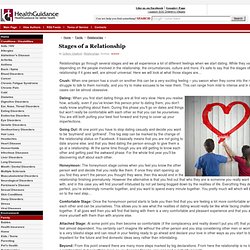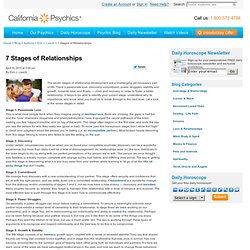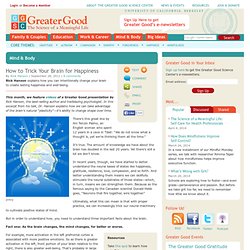

The five stages of a relationship. Five stages of anything immediately reminds me of death and the subsequent stages of grief.

But, our intimate relationships also follow a recognizable pattern. At every step, there is the possibility of growth or the possibility of a dead-end. Yet unlike the well-known and largely accepted stages of grief, there is no consensus on the exact developmental stages of a relationship. After poring over dozens of models proposed by therapists, researchers and clinicians, some commonalities emerged. Here is a hybrid look at the typical journey of a committed relationship — keeping in mind that every relationship follows its own path. 1.
This is the Hollywood version of romantic love. There is an emphasis on finding similarities between each other and glossing over differences. Each person tends to think of the other person constantly. A natural shift away from other relationships and a focus on creating a sense of "we" are common. 2. Consider this the reality check. Stages of a Relationship. Relationships go through several stages and we all experience a lot of different feelings when we start dating.

While they vary a little depending on the people involved in the relationship, the circumstances, culture and more; it's safe to say that the stages of a relationship if it goes well, are almost universal. Here we will look at what those stages are… Crush: When one person has a crush on another this can be a very exciting feeling – you swoon when they come into the room, you struggle to talk to them normally, and you try to make excuses to be near them. This can range from mild to intense and in some cases can be almost obsessive. Dating: When you first start dating things are at first very slow. Going Out: At one point you have to stop dating casually and decide you want to be 'boyfriend' and 'girlfriend'. Honeymoon: The honeymoon stage comes when you feel you know the other person well and decide that you really like them. 7 Stages of Relationships. By Eric J.

Leech The seven stages of relationship development are a challenging yet necessary part of life. There’s passionate love, discovery, commitment, power struggles, stability and growth, romantic love, and finally — crisis and recovery. In order to foster a better relationship, it helps to be able to identify your current stage, understand why its importance, and know what you must do to break through to the next level.
Let’s look at the seven stages in detail. Stage 1: Passionate Love This is what most people think when they imagine young or destined love. Stage 2: Discovery Under certain circumstances, such as when you’ve found your compatible soulmate, discovery can be a wonderful experience, but more than likely it will be a time of discouragement. Stage 3: Commitment We emerge from discovery with a new understanding of our partner. 47 Mind-Blowing Psychology-Proven Facts You Should Know About Yourself. I’ve decided to start a series called 100 Things You Should Know about People.

As in: 100 things you should know if you are going to design an effective and persuasive website, web application or software application. Or maybe just 100 things that everyone should know about humans! The order that I’ll present these 100 things is going to be pretty random. So the fact that this first one is first doesn’t mean that’s it’s the most important.. just that it came to mind first. How to increase serotonin in the human brain without drugs. Top Neuroscience Sites Reviewed - The 10 Best Neuroscience Websites. Home page. How to Trick Your Brain for Happiness.
This month, we feature videos of a Greater Good presentation by Rick Hanson, the best-selling author and trailblazing psychologist.

In this excerpt from his talk, Dr. Hanson explains how we can take advantage of the brain’s natural “plasticity”—it’s ability to change shape over time. gobyg There’s this great line by Ani Tenzin Palmo, an English woman who spent 12 years in a cave in Tibet: “We do not know what a thought is, yet we’re thinking them all the time.” It’s true. In recent years, though, we have started to better understand the neural bases of states like happiness, gratitude, resilience, love, compassion, and so forth. Ultimately, what this can mean is that with proper practice, we can increasingly trick our neural machinery to cultivate positive states of mind. But in order to understand how, you need to understand three important facts about the brain.
Fact one: As the brain changes, the mind changes, for better or worse. Fact two: As the mind changes, the brain changes. Your Amazing Brain. How to Hack Your Brain. Psychology studies relevant to everyday life from PsyBlog.